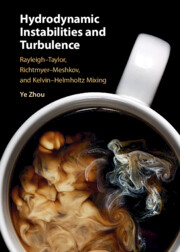 Hydrodynamic Instabilities and Turbulence
Hydrodynamic Instabilities and Turbulence from Part 3 - From the Microscopic to Cosmic Scales
Inertial Confinement Fusion (ICF) recently became the first technology to achieve ignition of hydrogen nuclear fusion fuel in the laboratory. Unlike magnetically confined fusion plasmas such as tokamaks, ICF requires high fuel compression. This implies a high convergence and high velocity implosion, usually driven with laser beams. This allows hydrodynamic instabilities to develop, primarily RTI and RMI. During the initial shock and acceleration phase when the shell is brought up to the peak implosion velocity, RMI instabilities at the various interfaces are followed by ablation front RT growth as the low-density plasma accelerates the dense shell of solid ablator and fuel. The implosion deceleration at the center is also unstable. The resulting spikes and bubbles prevent efficient fuel compression, and can also inject contaminants. I will discuss the measurement and mitigation of this problem. Z-pinch machines, which instead use an electrical current to compress the plasma, will illustrate the role of MHD in the ICF application.
To save this book to your Kindle, first ensure [email protected] is added to your Approved Personal Document E-mail List under your Personal Document Settings on the Manage Your Content and Devices page of your Amazon account. Then enter the ‘name’ part of your Kindle email address below. Find out more about saving to your Kindle.
Note you can select to save to either the @free.kindle.com or @kindle.com variations. ‘@free.kindle.com’ emails are free but can only be saved to your device when it is connected to wi-fi. ‘@kindle.com’ emails can be delivered even when you are not connected to wi-fi, but note that service fees apply.
Find out more about the Kindle Personal Document Service.
To save content items to your account, please confirm that you agree to abide by our usage policies. If this is the first time you use this feature, you will be asked to authorise Cambridge Core to connect with your account. Find out more about saving content to Dropbox.
To save content items to your account, please confirm that you agree to abide by our usage policies. If this is the first time you use this feature, you will be asked to authorise Cambridge Core to connect with your account. Find out more about saving content to Google Drive.